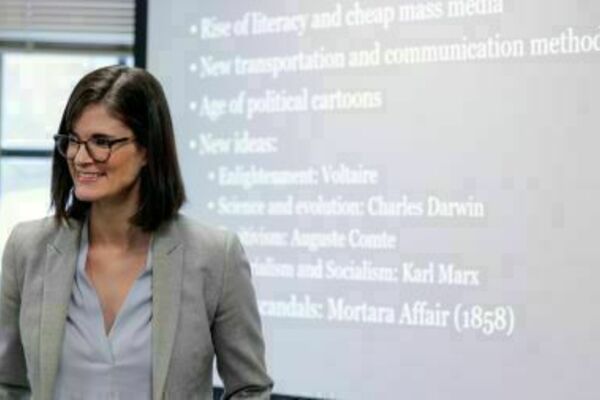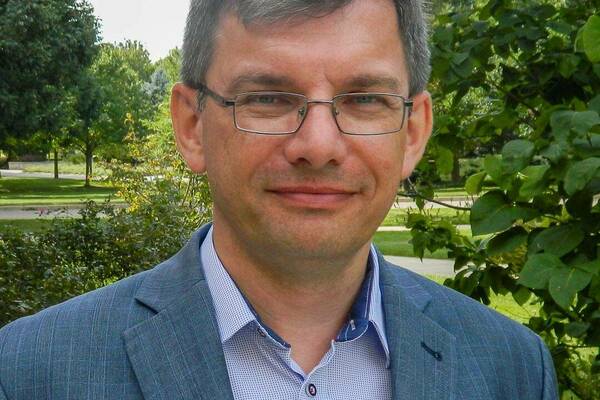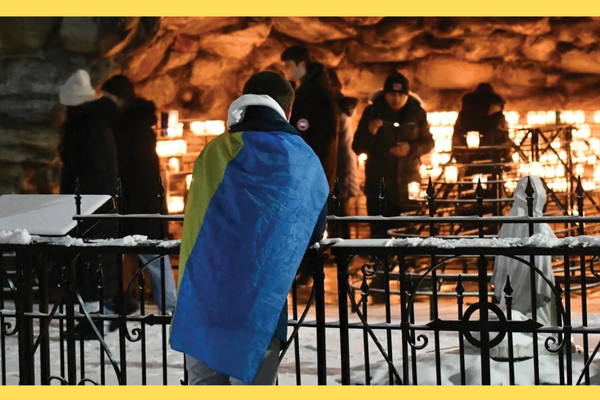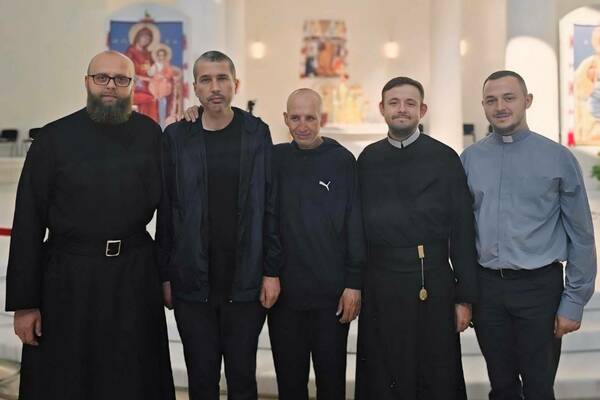

for European Studies
Human Dignity
What does it mean to respect the dignity of each person, especially the most disadvantaged, in Europe and in the context of European studies?
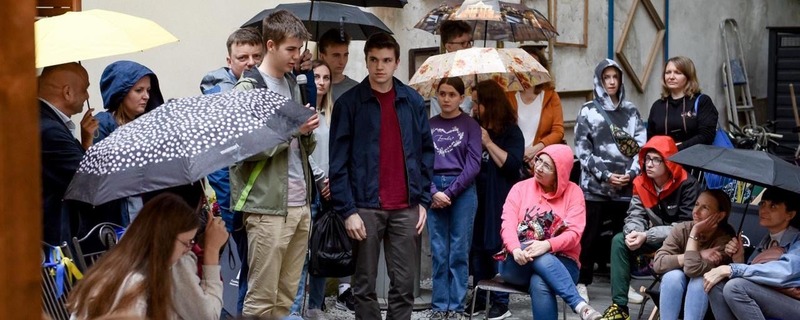
As part of the Keough School of Global Affairs with its commitment to integral human development and human dignity, the Nanovic Institute is particularly interested in exploring the meaning and implications of the idea of the dignity of each human person.
In 1948, the creators of the Universal Declaration of Human Rights (UDHR) introduced the concept of human dignity as a core principle in our global ethics. This groundbreaking document outlined essential rights that should be universally safeguarded and has been translated into over 500 languages. The UDHR is widely acknowledged for inspiring the adoption of more than seventy international and regional human rights treaties.
The Nanovic Institute is concerned with research on the respect and safeguarding of the dignity of all, especially the most vulnerable (migrants, children, and people with disabilities, to name a few examples). Article 3 of the European Convention of Human Rights states, “No one shall be subjected to torture or to inhuman or degrading treatment or punishment.” This assertion speaks to human dignity, especially as it relates to European nations. The institute is interested in the literature and legislation that corresponds to Article 3.
European traditions can offer substantive contributions to the concept and institutional translation of human dignity; however, it is important to also acknowledge that Europe’s history contains many terrible instances of human dignity violations, which serve as moral reference points and invitations to learn. The Nanovic Institute supports research that deepens understandings of human dignity and its contemporary challenges. The institute’s strategic plan explicitly asks the central question: “What does it mean to respect the dignity of each person, especially the most disadvantaged, in Europe and in the context of European Studies?”
In 2023, the Nanovic Institute will collaborate with other institutes and centers in the Keough School to commemorate the 75th anniversary of this significant achievement. This event will feature speakers from nations that, at the time, were not included in the declaration to share their perspectives on the history and meaning of human rights in Europe over the past three-quarters of a century.
For more details about this event, including upcoming news, multimedia, and articles, please visit the dedicated event page.
In 2023, the Nanovic Institute's director, Clemens Sedmak, played a key role in the Keough School's Dignity and Development Conference. He held a public conversation with a former judge on the European Court of Human Rights, András Sajó. Their questions and answers explored an important component of this conference as a whole, namely how the court, over time, has interpreted the concept of “human dignity.” Surprisingly, the European Convention on Human Rights does not anywhere explicitly mention “human dignity” in its text.
Judge Sajó shared how this omission means the court must weigh cases carefully and contend with other laws within the various European states individually. He painted a picture of the milestone cases that dealt with human dignity to illustrate this point and provide a good sense of where Europe stands today as a result of these rulings.
Read more of Judge Sajó's remarks
Within an armed conflict, the protection of human dignity is immensely challenging but critical. The war in Ukraine, which entered its full-scale form in February 2022, is one conflict where such difficulties are on display.
That is why, with a commitment to research and work that promotes human dignity, the Nanovic Institute has been deeply engaged in maintaining attention on this war and in giving our Ukrainian friends and colleagues a platform to share their story with the Notre Dame community and the world.
Do you find that the cause of human dignity needs our very best attention and research? Do you have an idea for research that can make a contribution?
If so, we would love to hear from you. Click the link below to fill out a brief, less than 5 minutes to complete, form, and we will follow up with you.
Start the research interests form
San Patrignano, Italy
This faculty grant provided funding for students to travel to San Patrignano for research on successful addiction rehabs and integral human development and the importance of the built environment. The students studied how all elements work together for addiction rehabilitation.
The student conducted research on healthcare accessibility for low-income populations in Barcelona, Spain, and applied for funding to support this endeavor. They extensively researched lower-income neighborhoods and transportation network gaps. During their time in Barcelona, they met with patients and healthcare practitioners to discuss access and health outcomes for different populations.
London, UK; Limerick, Ireland
This undergraduate summer break project examined the benefits, disadvantages, and overall effectiveness of public healthcare systems in the United Kingdom and Ireland, two model countries for universal healthcare. The project centered around interviews with doctors, professors, employees of the NHS/HSE, and other professionals who work with these organizations.
Faculty Advisor: Jennifer Robichaud
Seville and Cordoba, Spain
This undergraduate winter break project studied the lasting Moorish influence in southern Spain, particularly through the ornamentation belonging to the architectural style of Mujédar. The project sought to better understand the unique nature of the Andalucía region and contribute to the ongoing conversation regarding migrants and acceptance between different cultures and religions.
Faculty Advisor: Olivier Morel
Connemara, Ireland
This faculty grant aided in funding the conclusion of the Dresser Project, a research project focused on western Ireland. This project combined multidisciplinary approaches to materiality and homemaking to investigate how people in rural Connemara villages sustained their communities after waves of emigration. The project investigated tangible strategies of those who remained in their homes despite the often-overwhelming adversity associated with staying amidst the tumult of the nineteenth and twentieth centuries.
Huelva and Castilla-La Mancha, Spain
This graduate student project examined the decentralized immigrant regularization model in Spain, considering how local governance structures irregular migrants’ opportunities for regularization. The project connected the sociological and legal studies literature on civic stratification to that of local governance to show how municipal-level policies can alleviate or exacerbate existing social and political inequalities. The project also sought to contribute to literature by focusing exclusively on non-metropolitan areas, which have been largely neglected by academics and politicians, and analyzing why analogous municipalities enact policies that are more or less inclusive of undocumented populations.
Notre Dame, Indiana
This faculty grant provided funding for the development of a history course on Nazi Germany. The course aims to go beyond the narrow histories of Germany and open the topic up to its full European dimensions.
Paris, France; Berlin, Germany
This undergraduate winter break project explored the formation of national identity, specifically in the rather stable modern economic and political landscapes of France and Germany. The project investigated if and how a national identity must change when the equilibrium of cultural stability is tipped, focusing primarily on the recent growth of immigration in both countries.
Faculty Advisor: Sonja Stojanovic
London, England
Focusing on the T4 euthanasia program that systematically killed an estimated 70,000 people with disabilities and mental ilnesses in Nazi Germany, this undergraduate fall break project explored the complex relationship between the ideologies of Nazi perpetrators and America’s own eugenic beliefs. The project utilized documents in London’s Wiener Library which holds the complete records of the UN War Crimes Commission.
Faculty Advisor: John Deak
Berlin, Germany; Paris, France; Notre Dame, Indiana
This faculty grant provided funding for the German translation of Olivier Morel’s film Ever, Rêve, Hélène Cixous for its screening at a German film festival. The film centered around the formation of Hélène Cixous, a feminist legend, 1968 activist, playwright, and poet, examining her friendship and company along the way.
Lviv and Kyiv, Ukraine; Budapest, Hungary; Bremen, Germany; Somerset (NJ), New York, Amherst, and Boston, United States
This graduate student project explored the development of the Ukrainian human rights movement in the Soviet Union, challenging the perception of the dissident movement as anti-governmental and oppositional. The project focused on the ways that the most influential Ukrainian dissidents abandoned the early twentieth-century tradition of confrontational opposition for legal means enshrined in the Soviet constitution. The project emphasized the significance of the regional perspective in the emergence and distribution of human rights ideas across geographic space.
Faculty Advisor: Semion Lyandres
Notre Dame, Indiana
This faculty grant provided funding for a visit from Fabienne Kanor, a French author and an important voice in current debates on migration and national identity in Europe. During her visit, Kanor gave a “Performance Talk” entitled “Another Sea to Cross,” given in a bilingual English-French version. Her presentation drew from her work as a novelist and filmmaker, delving into questions of immigration and displacement in Europe and bringing together three crucial moments that feature the two (the trans-Atlantic slave trade, the migrations of French Caribbean people to France, and contemporary migrations and asylum seekers).

Helsinki, Finland
European countries handled the refugee crisis of the later half of the 2010’s differently. In Finland the government provided refugees within their borders with digital identities via blockchain networks. This undergraduate winter break project studied the technical aspects of the self-sovereign identity platform and whether or not it could be implemented at a transnational level by the UN.
Faculty Advisor: Eileen Hunt Botting
Lisbon, Portugal
This faculty grant provided funding for travel to Lisbon to continue archival research on Portuguese captives in the Barbary Coast and Muslims in Portugal. The research project sought to identify Portuguese colonial officers and slave traders captured and held in bondage in the Barbary Coast under Ottoman rule. The project aimed to understand how their years in captivity transformed their lives, whether captivity altered their understanding of the transatlantic slave trade, and how they related their experiences to the lives of African people they had previously bought and sold.
Berlin, Germany
An aging society, consistently low birth rates, and a rising influx of refugees has left the German population to consider what it means to be German, a question they have struggled to answer since the end of World War II and the rejection of Nazism. This undergraduate winter break project explored how architectural design can foster community, artistic creativity, and a sense of individual and national identity in modern Berlin. The project also employed traditional and modern German construction techniques to propose a mass-timber tower, aiming to bring Germany to the forefront of the global sustainability movement.
Faculty Advisor: Kim Rollings
Notre Dame, Indiana
The emergence of Black Lives Matter movements around the world has catapulted interest in scholarship on Europe’s legacies of empire not only in former colonies but within Europe itself. There is currently a lack of literature on the significance of slavery and colonialism in the history of France itself. This faculty grant aided in funding the French translation of Sophia White’s most recent book, Voices of the Enslaved: Love, Labor, and Longing in French Louisiana, for publication in France to spearhead new scholarship on this topic.
Notre Dame, Indiana
This faculty grant provided funding for a visit from Gaël Faye, a celebrated contemporary author and award-winning rap and hip-hop artist. Faye met with students for informal discussions and held a public event where he read excerpts from his first novel and spoke on his experiences as an author, songwriter, and artist with Notre Dame professor Alison Rice. Faye’s novel, Small Country (2016), is a bestseller in France that has been awarded many literary prizes, and he had recently won a Victoire de la Musique, the French equivalent of a Grammy, for his music.
The Hague, Netherlands
This faculty grant provided funding for travel to the official launch of the new Hague Rules on Business and Human Rights Arbitration by the Ministry of Foreign Affairs of the Netherlands. Diane Desierto was one of the authors for the last three years as a Member of the Drafting Team chaired by Senior Judge of the Iran-US Claims Tribunal Bruno Simma. The launch addresses the general public on the particular uses of the new Hague Rules for individuals or groups to pursue human rights claims through international arbitration against transnational business and states.

Oslo and Halden, Norway
This undergraduate spring break project explored the juxtaposition of the contrary philosophies of criminal justice and human dignity in various prison systems. The project focused on prisoner development in Norwegian prisons, particularly Halden fengsel, a prison whose model of respect, freedom, responsibility, and rehabilitation has led to marked decreases in recidivism. The research sought to understand how such a system can be introduced to the United States, and how prisoners can be treated with dignity within a criminal justice system.
Faculty Advisor: Edward Kelly
United States; Italy
This faculty grant co-sponsored a new Fratelli Tutti Fellowship with the Kroc Institute for International Peace Studies, the Kellogg Institute for International Studies, and the Catholic Peacebuilding Network. The fellowship enabled Melinda Davis (ND ’19) to work as a Junior Coordinator for the Holy See’s COVID-19 Commission. The commission is a working group responsible for research on the pandemic and envisioning a post-pandemic world supported by experts in health, economic, ecology, and security.
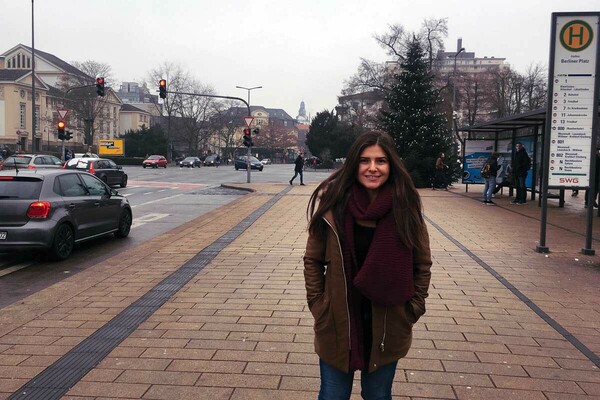
Hessen and Berlin, Germany; Vienna, Austria
This graduate student project explored how community-building takes place among minority migrant populations—spatially and temporally—in relation to the already existing communities in the urban places where migrants settle. The project focused on identity formation from a relational and performative perspective through the lens of place-making, language use and retention, and religious practices among the Zazaki diaspora in Europe and western Turkey. The project sought to answer what the dynamics of identity formation, maintenance, and performance are, and how these Zazaki speakers negotiate and produce/reproduce their identities as shaped by their environment.
Faculty Advisor: Maurizio Albahari
Berlin, Germany
More than one-fifth of Germany’s inhabitants are foreign-born or children of immigrants, yet Germany’s educational system often fails to integrate children with these backgrounds. Campus Rütli was founded in 2008 by the government of Berlin to address these growing civil disturbances and disadvantages in the highly diverse district of Neukölln. This undergraduate winter break study sought to better understand Campus Rütli’s policies of immigrant assimilation through education, revealing what is effective in dealing with the social, economic, and local repercussions of hyper-diverse migrant communities.
Faculty Advisor: Steffen Kaupp
Notre Dame, Indiana
This faculty grant provided funding for a research cluster that explores the ambiguities of migration and cross-cultural exchange in culture and daily life during multiple periods of religious, political, and cultural upheaval, particularly in the European context. This research cluster sought to answer what it means to welcome—or reject—the “stranger,” whether these strangers are enemies or friends, and whether they are our “neighbor” or a threat to our way of life.
London, England; Dublin, Ireland
This undergraduate summer break project explores the emigration of French Huguenots to Ireland, focusing on the complex relationship between a people fleeing religious persecution from Catholics to an island where Catholics were the persecuted. The project conducted archival research in London and Dublin, including Huguenot sermons and military records, to study the lives of French Huguenots and their participation in the Jacobite War in Ireland.
Faculty Advisor: Rory Rapple
Notre Dame, Indiana
This faculty grant provided funding for a visit from Ivan Gerginov, Deputy Commissioner, Commissariat for Refugees and Migration, Republic of Serbia. Gerginov held a public lecture sharing his experiences working with refugees and migrants from the Balkan crises to the present migrant crisis in Europe. He also held personal meetings where he advised faculty members on policy outreach and the need for policy interventions.
Munich and Stuttgart, Germany
This undergraduate spring break project investigated the efficacy and shortcomings of current job assistance and labor market integration programs in Germany for refugees. The project explored the current state of these programs through interviews with local specialists, visits to job preparation centers, and meetings with Munich-based scholars. The project sought to understand the German labor market for refugees and the challenges it presents to Germany’s economic identity for future research.
Faculty Advisor: Denise Della Rossa
Frankfurt, Wiesbaden, and Bonn, Germany
The Frankfurt-Auschwitz Trial (1963-1965) was designed to force all West German citizens to face their own complicity with the Nazi criminal system, but in reality failed to present the Holocaust as anything but a summation of individual crimes committed for individual reasons. This graduate student project examined the place of the Frankfurt-Auschwitz Trial in post-war Germany’s evolving relationship with domestic law. The project’s archival research informed a dissertation on the same subject.
Faculty Advisor: John Deak
This project studying the architecture of medieval buildings used as senior living facilities allowed this architecture student to study how these buildings are laid out to incorporate into her work on a design for a US community.
London and Oxford, England
This undergraduate fall break project investigated the ethical, social, and political issues surrounding public displays of human remains in museums, focusing on museums in London. The project considered how London preserves and celebrates its history, including the issues of the past, and explored London as a setting for a film screenplay in which the research would be used.
Faculty Advisor: Christine Becker
Rome, Italy
This faculty grant sponsored a workshop entitled “Micro-experiences of Care” led by Clemens Sedmak and Ilaria Schnyder von Wartensee as part of their larger research project with the Humanitarian Corridor (est. 2017). The project builds upon the understanding of the role of religion in international affairs, including themes of migration, integration, community building, and identity, and explores whether the migration model of a Humanitarian Corridor leads to successful integration. The workshop is an important feedback tool in the spirit of intellectual integrity, acting as a forum of exchange and informing stakeholders about the research’s methodology and progress.
Athens, Greece
This undergraduate winter break project investigated social implications of the construction of the first mosque in Athens, Greece since the Ottoman Empire’s occupation of the city in 1833. The project focused on whether Muslim migrants are encouraged by the construction of a public mosque in Athens as a sign of acceptance and support of their religion, and how conservative Greeks are responding to the construction.
Faculty Advisor: Rev. Robert Dowd, C.S.C.
Notre Dame, Indiana
This faculty grant sponsored a visit from Sandro Cattacin, a professor at the University of Geneva (Department of Sociology). Cattacin spoke at the Mendoza College of Business’s spring 2019 lecture series “Ten Years Hence,” presenting on European, Middle Eastern, and North African migration patterns and the Swiss national guest worker program. He also engaged with students in discussion and networked with faculty members.
Notre Dame, Indiana
This faculty grant provided funding for a virtual discussion with Nabil Wakim, a journalist for the French newspaper “Le Monde” and author of L’arabe pour tous: Pourquoi ma langue est tabou en France. In his book, Wakim discusses France’s relationship with the Arabic language in the context of growing islamophobia within the country. The virtual discussion was centered around the book.

Berlin, Germany
This graduate student project studied how Zazaki-speaking immigrants and their descendants build their communities through everyday life practices in Germany. The project consisted of anthropological research in the form of long-term participant observation. The research done in this project informed a dissertation which explored how group identity is expressed across nation-states among minority immigrant populations by focusing on domestic and international migration of Zazaki speakers in western Turkey and Germany.
The student conducted a study on the cultural and educational integration of Maghrebi immigrants into French society in Southern France. The research examined integration through three dimensions: housing, education, and government/policy. Given the student's family ties in the region and proficiency in French, they were well-positioned to undertake this investigation.
Granada and Madrid, Spain
This undergraduate spring break project explored the setting in which Frederico García Lorica, renowned poet and playwright, lived and died in Spain as research for a film adaptation of a play co-written by the student researcher. The project sought to experience the world through the land which influenced him, gaining influence and inspiration from the same sources to better understand his life and works.
Faculty Advisor: Susanne Wengle
Lisbon and Coimbra, Portugal
When discussing the refugee crisis, Portugal is often overlooked; while many immigrants do not even consider the country as a destination, it has agreed to take double the number of immigrants allocated to them by the EU. This undergraduate spring break project investigated what the attitudes toward immigrants, particularly Syrian/Middle Eastern refugees, are like in Portugal and what the country has done proactively to either attract or deter immigration. The project interviewed government officials, NGOs, migrants, and Portuguese citizens.
Faculty Advisor: Marcio Bahia
Paris, France
This faculty grant supported a course taught in the Notre Dame Summer Study Abroad Program in Paris, “Postcolonial Paris: Contemporary French Cultures in Literature and the Arts.” The course concentrates on the ways contemporary “French” cultures are reconsidered and redefined by writers and artists from outside France. The course explores novels by immigrants and second-generation immigrants, critical articles and book chapters by contemporary scholars and politicians, films, and cultural events including a ballet at the Opéra Garnier.
Paris, France
This faculty grant supported the completion and outreach campaign of a web documentary entitled “Profil 14-18,” created by Olivier Morel in collaboration with TV5-Monde. The web documentary explored the stories of seventeen people of various nationalities engaged in the First World War.
London, Gloucester, Bradford, and Wigan, England
This graduate student project explored how nineteenth-century British women writers used representations of physical mobility to resist or critique restrictive gender ideologies by analyzing both contemporary fiction and women’s life writing. The project suggested that the ability to travel, even on a small scale, played a significant role in how women conceptualized their relationship to convention. The project sought to contribute to scholarship by offering fresh insights on a neglected aspect of women’s mobility and placing a new emphasis on women’s ability to navigate and resist social restrictions in their everyday lives.
Faculty Advisor: Sara Maurer
Valencia, Spain
Pedro Sánchez took the Prime Minister office of Spain in 2018, aiming to make empathy toward refugees a primary concern. This undergraduate summer break project explored Spain’s transition to one of the most welcoming European countries for migrants, focusing on how public opinion and the political environment toward refugees have changed and how this affects the experiences of refugees in Spain. The project aimed to create a conversation about the intersection between a democratic government and the multidimensional effect its rhetoric has on global development.
Faculty Advisor: Ilaria Schnyder
Seville, Spain; Rome, Italy
This graduate student project examined the ways that the serial, incomplete emancipations toward the independence of the Dominican Republic transformed race and the institution of slavery in the colony. The project followed the activity of the colonizing powers (Spain, France, and Saint Domingue/Haiti), slave holders, and freedom-seekers in slave markets, criminal courts, notarial offices, plantations, and churches in a colonial struggle for freedom. The project also collected material for a secondary research topic concerned with how mahogany shaped racial ideas, freedom, landholding, and state-building in the Spanish Empire from the sixteenth through nineteenth centuries.
Faculty Advisor: Karen Graubart
Rome, Italy
This undergraduate winter break project investigated the effects the 2019 change in national government and ministerial leadership in Italy had on refugee integration in Italy. The project, consisting of interviews with key individuals, institutions, and organizations, sought to meet the need for updated literature given the significant evolution of the political environment. The information collected would later be used in a senior thesis project.
Faculty Advisor: Maurizio Albahari
Santander, Spain
This graduate student project explored the city of Santander, Spain, the setting of Natasha Ali’s novella Santander. The novella follows the journey of a young Pakistani student who has recently moved from her hometown of Karachi to study at the prestigious Universidad de Cantabria in Santander, tackling themes of foreignness, identity, inheritance, outsider-status, and nostalgia.
Geneva, Switzerland; Brussels, Belgium
This undergraduate fall break project continues summer research on-site in Geneva, Switzerland and Brussels, Belgium. The project questions how European agencies, international agencies, and non-governmental organizations based in Europe are responding to the influx of refugees generally and providing for the most disadvantaged and vulnerable population—those with disabilities. The project included visits with the International Rescue Committee, the International Committee of the Red Cross, and the European Commission, among others.
Faculty Advisor: George Lopez
Notre Dame, Indiana
This faculty grant sponsored a screening of the film Habemus Feminas at Notre Dame’s Browning Cinema and a discussion with filmmaker Silvan Maximilian Hohl from Switzerland. The film captures a 2016 pilgrimage of women from St. Gallen, Switzerland to Rome that demonstrated “the Catholic Church in solidarity with women” and submitted a petition to Pope Francis.
Madrid, Spain
This undergraduate fall break project explored the curtailing of government-funded, gender equality Institutions in Spain following the 2008 economic crisis. The project examined whether women were at greater risk for unemployment than men in Spain and if women experienced less economic mobility as a result of the austerity policies adopted in Spain following the 2008 economic crisis.
Faculty Advisor: Mary Flanner
United Kingdom
This faculty grant provided funding for an interdisciplinary conference exploring the complex reality of xenophobia and what role it played in medieval and early modern societies within Europe and beyond. The conference had a special focus on the domains and intersections of literature, religion, theology, politics, and history, featuring keynote speakers and panel conference papers highlighting new ways of thinking about the issue of “the stranger” in this historical context that can inform our contemporary understanding.
Oslo, Norway
This undergraduate spring break project explored questions about refugees and their effects on the identity of Norwegians, considering how refugees’ experiences shape Norwegian culture, and how institutions are shaping attitudes towards these changes. The project looks at the issues through the lens of the blending of refugee/Norwegian culture through institutionalized and structural approaches, and the lens of cultural blending through unstructured socialization.
Faculty Advisor: Justin McDevitt
Trondheim, Norway
This graduate student project investigated and compared the institutional environments and pressures of higher education in the United States and Norway that give rise to “study drug” use among university students, including tuition costs, the perceived need for a college degree, cultural assumptions about going to university, and access to health care. The project examined the structure and value of higher education in Norway compared to the United States and how this affects the discussion of study drugs in each location. The research informed a future dissertation and established connections for future research.
Faculty Advisor: Susan Blum
Athens and Examilia, Greece
This faculty grant supported a Roma soccer team in the village of Examilia outside of Ancient Corinth, Greece. The team, which had a transformative effect on the village and its young men, had lost its primary sponsor, and needed extra funding. The team was a way for young Roma to escape the cycle of drug usage in the village and provided a way for them to integrate and be accepted in Greek society, where they have been historically ostracized.
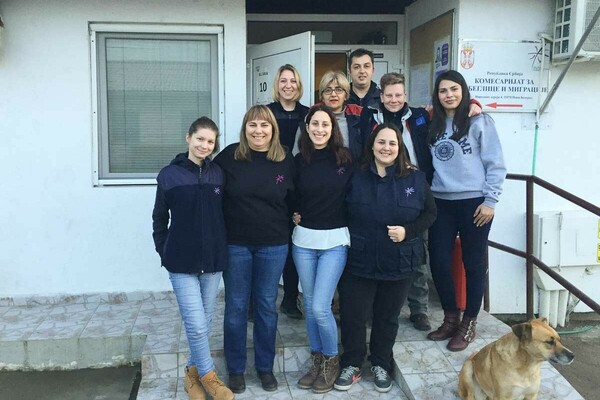
Belgrade, Serbia
This graduate student project examined the complexity of migration by comparing experiences of transitory refugees encamped in Serbia and Kenya, investigating patterns of integration and exclusion of encamped and transitory refugees within their host communities. Engaging with biological and human cultural concepts, the project sought to understand how refugees, who survived wars, cope with the immense changes brought by forced displacement while struggling to restructure their identity and place at both individual and collective levels. The project aimed to contribute to scholarship on forced/transitory migration and general refugee phenomena, specifically the process of integration, community building, and policies that respond to these crises.
Faculty Advisor: Rahul Oka

Olot and Madrid, Spain
This graduate student project investigated different narratives and images of female bodies’ inspections (medical, inquisitorial, juridical, and ethnographical) that shaped the definition of gender in the Hispanic world from the sixteenth century to the present in relation to other European theories and knowledge about anatomy. The project conducted archival and bibliographic research and examined anatomical and artistic sculptures and models to inform a dissertation on the subject.
Faculty Advisor: Carlo Jauregui
Image Credit: At the Water Trough by J. Alden Weir, 1876-1877, Smithsonian American Art Museum.
London, England
This graduate student project explored female education reform in India and the people who held the most power to enact it—British women and elite Indian men, the latter of which adopted a veneer of whiteness to become “native gentlemen.” The project investigated how this specific performance of race and gender allowed white women and Indian men to form professional partnerships even during the final century of the British Empire, a period where both groups were strictly segregated.
Faculty Advisor: Fr. Robert Sullivan
Brussels, Belgium
This undergraduate spring break project studied what systems are in place through NGOs to alleviate the issue of increased immigration that has faced Brussels’s government since 2015. The project focused on interactions with social workers and volunteers on the frontlines of the problem in Maximilien Park.
Faculty Advisor: Emilia Powell
Washington, District of Columbia
This graduate student project explored documents related to Italian writer Primo Levi, a scientist and Holocaust survivor, to understand how Levi’s works are influenced by the dominant Anglophone culture of the post-war era. The project conducted archival research on early chapters of Levi’s If This is a Man at the United States Holocaust Memorial Museum as well as study of the presence of British prisoners in concentration camps, particularly Auschwitz.
London, England; Strasbourg, France
This undergraduate summer break project examined the experiences of the Roma in two different countries, England and France, to study the complex interactions between individual Roma populations and the communities in which they live. The project aimed to understand the Romani within the context of their specific, diverse communities, and recognizes the non-homogenous economic, social, and cultural circumstances of each culture group.
Faculty Advisor: Emma Rosenberg

Ljubljana, Slovenia
L’Arche is a community-based organization that serves and respects the human dignity of adults with intellectual and physical disabilities, providing independence, community, and purpose for these marginalized individuals. This undergraduate winter break project continued research on L’Arche in regions of conflict, examining how the L’Arche model is operating in Slovenia, a country which has experienced numerous regime changes and economic crises in the past century. The project compares this analysis of L’Arche Slovenia to a prior analysis of the organization in Palestine.
Faculty Advisor: George Lopez
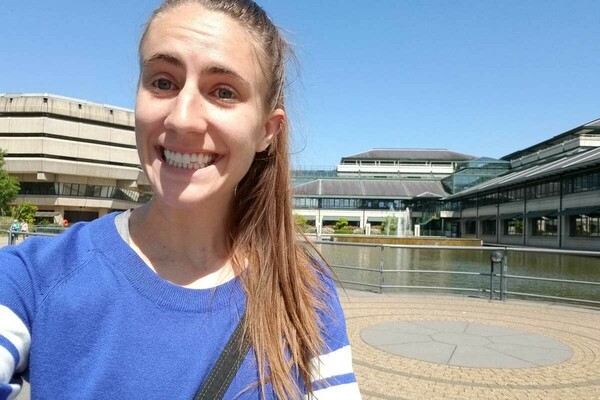
Dublin, Ireland; Belfast, Northern Ireland
Scholarship on women’s roles during The Troubles has often simplified them to that of supporters or peacemakers. This undergraduate summer project moved past the traditional view of women working as peacemakers and enriches our understanding of how women and gender influenced paramilitary groups and violence during and after The Troubles. The project focused on women’s participation in the Ulster Volunteer Force and the government-organized Ulster Defence Regiment rather than their roles in the IRA.
Faculty Advisor: Gail Bederman
Notre Dame, Indiana
This faculty grant aided in funding publication for a co-edited volume on the topic of women and work in contemporary France. The contributions for the volume tackled a wide range of work experiences from salaried work in academic, artistic, corporate, and working-class worlds to unpaid—reproductive, domestic—labor, illegal activities, and activism.


